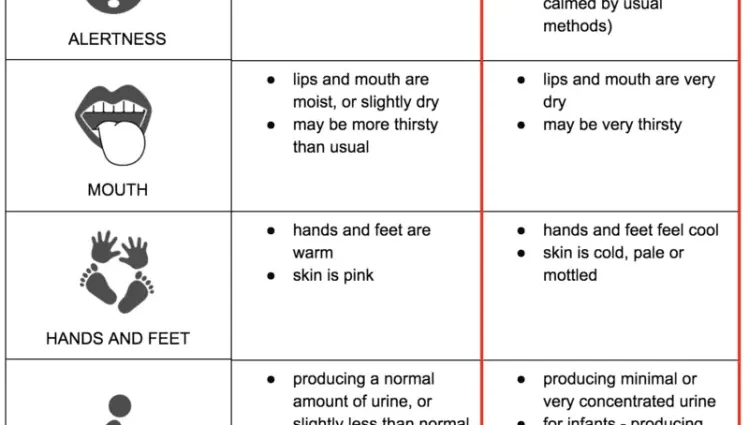Contents
My child has gastro!
Few children escape gastroenteritis. Each year, more than 500 of them are affected. She’s an unwanted guest of the holiday season. A few good reflexes can help your child experience this episode more comfortably and without having to go to the emergency room. Here are which ones.
What is gastro?
“Simultaneous inflammation of the gastric mucosa and the intestinal mucosa”, this is how the Larousse defines gastroenteritis.
What are the causes of gastro in children?
Most often, the culprit is a virus (rotavirus, adenovirus, etc.). Contamination then occurs through contact with another patient, when there is stool residue on the hands. More rarely, it is a bacterium that is at the origin (salmonella, escherichia coli, etc.), after the consumption of a contaminated drink or food. This is called food poisoning.
Symptoms
Acute diarrhea (more frequent and more watery stools than usual) as well as vomiting are the two signs that immediately lead to gastroenteritis. There may also be a fever.
A gastro episode lasts about 2 to 5 days.
The diagnosis
It is based on the clinical examination and the questioning of the small patient and his parents on the symptoms. A stool analysis may be offered.
How to avoid contamination?
It is based on respecting barrier gestures, including regular hand washing with soap and water, especially after going to the toilet and before going to the table. To limit the risk of bacterial gastroenteritis, make sure to eat well-cooked meat, not expired foods and to consume uncontaminated water. On this last point, tap water in France is healthy, but you have to be more vigilant when traveling, in countries like India, where water is then to be consumed only in bottles.
When should you consult?
For children under 2 years old, see the general practitioner or the pediatrician if the child: “presents at least three watery stools in a few hours, whether or not associated with vomiting”, advises Health Insurance on its Ameli site. Fr.
For more than 2 years, it is necessary to consult if the gastro lasts more than 2 days or worsens. If the child loses more than 5% of his weight, you must consult urgently, because it is a sign of dehydration. The child will then sometimes have to be hospitalized, to be rehydrated intravenously.
What are the possible treatments ?
The hygiene and dietetic measures are the reference treatment. Above all, the child must rest, to recover as quickly as possible.
Medicines such as antiemetics that stop vomiting or anti-diarrhea should be avoided (unless medical advice to the contrary).
To tame the pain or fever, when it is badly supported, you can give it paracetamol, not exceeding, of course, the recommended daily dose.
Nonsteroidal anti-inflammatory drugs are not recommended because they are contraindicated in cases of dehydration.
Finally, antibiotics will be prescribed only in the event of gastroenteritis of bacterial origin. They are totally helpless in the face of gastrointestinal illness of viral origin.
Beware of dehydration
The main complication of gastro is dehydration. The most vulnerable are the least 6 month old babies, because they can become dehydrated very quickly.
Signs of dehydration in a baby are:
- unusual behavior;
- a gray complexion;
- dark circles in the eyes;
- unusual drowsiness.
A decrease in urine volume, or darker urine, should also alert.
To avoid it, you have to be very careful that the child drinks enough. Oral rehydration fluids (ORS) are recommended throughout the gastro episode, for infants as well as for older children. These powder sachets can be bought in pharmacies. They compensate for water and mineral salt losses.
“If you are breastfeeding, continue breastfeeding as usual and offer ORS between feeds,” advises Health Insurance. “If your child drinks powdered milk, replace that milk with ORS. After 4 to 6 hours maximum, reintroduce the usual milk and give her ORS between bottles as long as the risk of dehydration persists. If your child is eating a variety of foods, keep the same foods and give them oral rehydration solution as much as they want. “
On the plate
Along with hydration, nutrition is the other mainstay in making your little one feel better faster.
To remember: it will be necessary to divide the meals, to calm the vomiting (5 to 6 small meals per day). Give it smaller amounts, but more often. If he’s not hungry, don’t force him. To help him, you can serve him whatever pleases him, while avoiding too fatty or too spicy dishes.
Only hydration is essential. At the onset of gastro, he is given broths, soups. And we salt more than usual, to compensate for the loss of mineral salts. It’s time to put rice, applesauce, bananas on the plate.
The vaccine
There are two vaccines against rotavirus gastroenteritis, Rotarix® and Rotateq®. This vaccination is not recommended in the French vaccination schedule. Only your pediatrician can tell you whether or not it is appropriate to vaccinate your little one. If the answer is yes, start early. “From the age of 6 weeks,” advises the vaccination-info-service.fr site. “It must be completed by the age of 6 or 8 months at the latest, depending on the vaccine used. “










